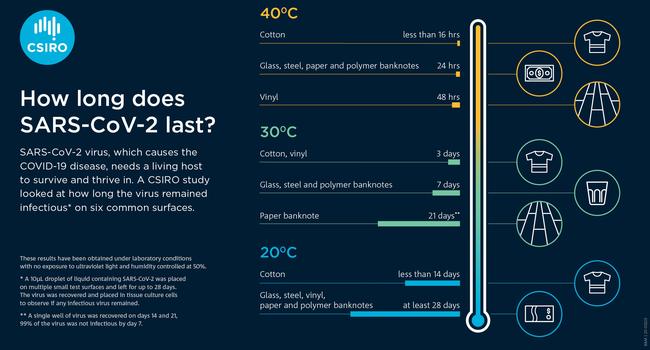COVID-19 virus can last for four weeks on surfaces, CSIRO study finds
Australian scientists have discovered much longer virus survival times which will have far-reaching effects for calculating risk.

Coronavirus
Don't miss out on the headlines from Coronavirus. Followed categories will be added to My News.
The virus responsible for COVID-19 can survive on surfaces for up to 28 days – twice longer than initially thought.
It includes common surfaces such as bank notes, glass on mobile phone screens and stainless steel.
The CSIRO research replaces previous studies which found the virus could at most last 3-7 days, with the most dire predicting it lived for up to 14 days.
Most shocking, and likely to accelerate the end of the cash economy, the study found the virus active on banknotes after 21 days, during which time they may have circulated widely.
“Establishing how long the virus really remains viable on surfaces enables us to more accurately predict and mitigate its spread, and do a better job of protecting our people,” CSIRO chief executive Dr Larry Marshall, pictured, said.
“Together, we hope this suite of solutions from science will break down the barriers between us, and shift focus to dealing with specific virus hot spots so we can get the economy back on track.”
The study, published in the international journal Virology, will prompt warnings from the CSIRO to health experts and businesses dealing in large numbers of used bank notes.
The tests were carried out at the CSIRO Australian Centre for Disease Preparedness (ACDP) in Geelong.

They also found the virus survived longer at lower temperatures and tended to survive longer on non-porous or smooth surfaces such as glass, stainless steel and vinyl, compared to porous complex surfaces such as cotton.
ACDP deputy director Dr Debbie Eagles said the virus survived for up to 10 days longer than the flu virus.
“This reinforces the need for good practices such as regular handwashing and cleaning surfaces,” Dr Eagles said.
“At 20C, which is about room temperature, we found the virus was extremely robust, surviving for 28 days on smooth surfaces such as glass on mobile phone screens and plastic banknotes.
“For context, similar experiments for influenza A have found it survived on surfaces for 17 days, which highlights just how resilient SARS-CoV-2 is.”
SA Health advice states “studies suggest the virus that causes COVID-19 may survive on surfaces for a few hours or in rarer cases up to several days”.
The findings came as South Australia recorded two new cases bringing the total to 475, with five active cases.
A man in his 30s and a man in his 50s, tested positive in quarantine on return from overseas. Both have been in a medi-hotel since their arrival and there is no public health risk.
More than 497,000 tests have been undertaken.
